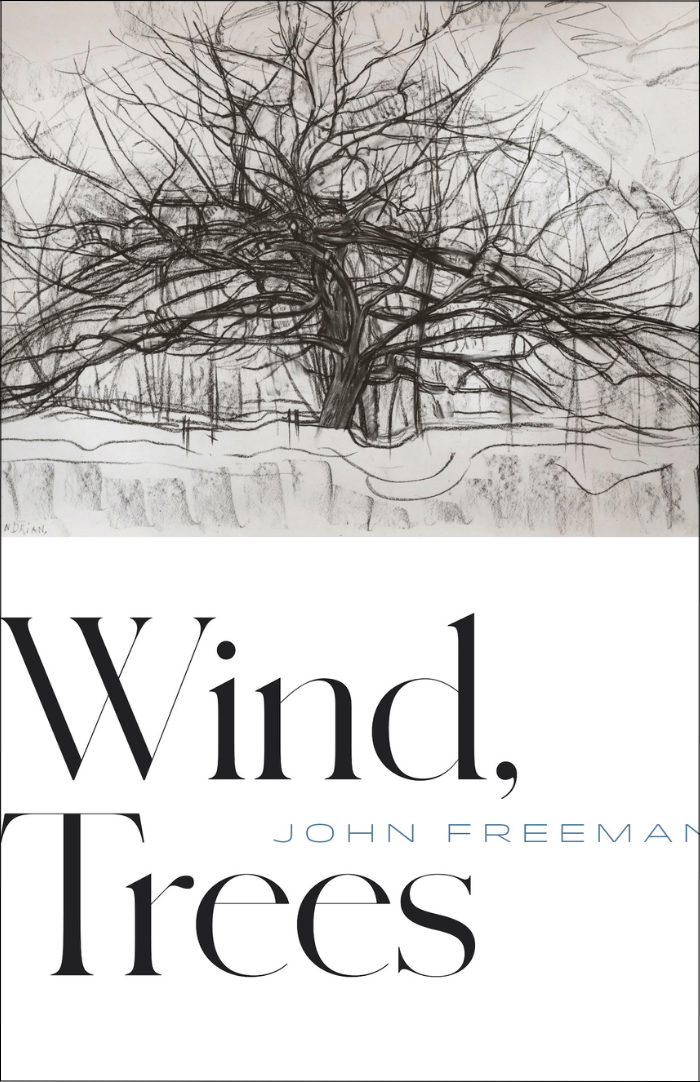
In Wind, Trees, John Freeman presents a meditation on power and loss, change and adaptation. What can the trees teach us about inhabiting space together? What might we gain if we admit we do not control the wind, and cannot possibly carry all we’ve been handed? Offering a stark moral critique of pandemic self-preservation—as “justifications grew / with greed like vines / up the side of a tree / taking everything”—Wind, Trees joins the ranks of politically urgent yet timeless collections like The Lice by W.S. Merwin. Through narrative lyric and metaphysical pulse, meandering thought and punctuating quiet, Freeman studies the devastating failings of humanity and the redemptive possibilities of love.
ISBN: 9781556596483
Format: Paperback
Sleeping in the Crossbreeze
The air’s sweet tonight
across the sheets
your hair a tidal wash
What boat is this we’re on
Why does the sea feel
so calm some evenings
so dark on others What
is love but feeling
there’s no compass left
to consult no wind necessary
no destination needed just
the air this wind the night blue
as night Your body
by moonlight
“The central place, in life, of openness and learning—from truths hard won to the great mysteries on the horizon—is what most animates this book. . . . Wind, Trees clearly cares about the natural world and our place in it, our human relations to the elements and the animals, the damage we’ve done. A title like ‘The Heat Is Coming’ hardly needs a poem at all. But Freeman makes no human claims on nature nor even really on nature’s behalf, refusing to speak with any certainty for anything as grandly mysterious and loving as a forest, which speaks its own languages. . . . Still, much remains to be learned in these poems of middle age, of and from nature, of and from our human mentors—those Barry [Lopez] would call our elders—of and from a book bound by the irreconciled tension between one thought (‘Maybe one day I will learn how to live’) and another (‘how badly I want’).” —Scott Korb, Los Angeles Review of Books
“Wind, Trees has Freeman’s characteristic quietness: an understated, restrained quality which lends itself particularly well to post-pandemic writing. . . . Through exploration of form, repetition of ideas, and meandering of thought, the collection quietly stirs up issues of loss, friendship and partnership, and how to coexist in this dark yet brave new world.” —Rain Taxi
“When you pick up . . . John Freeman’s gentle, wise poetry collection Wind, Trees you’ll see that it unfurls its imagery as part of its structure. The first half is bound by the common element wind; the second, by what the wind animates: trees. I read Wind, Trees as a collection that looks at what brings groups to life, a spirit that you can feel whether gazing up in a reverie from the center of a stand of trees or communing with other people.” —Alta
“The poems I like most in John Freeman’s new collection come in the book’s second section, focused on trees. These seem to operate within the same rooted, deliberate grandeur of a grove of old-growth hardwoods. Freeman, a careful arborist, attends to each branch and leaf, describing what we might learn from the world by learning to read the messages communicated by the many vibrant living beings surrounding us.” —Orion
“What strikes me about [“Dusk”], as well as many others in the volume, is its humility. Its refreshing lack of cynicism when (for some of us, me included) cynicism has become the jerk reaction, the easy means of coping with what ails us. John Freeman instead probes the depths of human affinity and the value of guidance without over-celebrating a given poem’s subject.” —Debra Gwartney, Terrain.org
“In Freeman’s ruminative, mournful, and precise follow-up to The Park, he says goodbye to the known world while savoring everything within it, even as it burns. The poems urge the reader to slow down, the line-breaks skillfully moving against the grain of natural phrasing, leaning toward ‘a world/ where imagination and remembrance are the same thing.’. . . These deep and timely meditations beautifully illuminate humanity’s plight.” —Publishers Weekly
“Following his urbane ruminations in his last collection, The Park (2020), Freeman’s observations about humanity’s impacts on the natural world and the resulting spiritual conundrums remain sharp. His lines are, at times, sublime. . . . The poet reminds us that we all share the experience of wind and trees as sensual truths. These poems record sensory encounters that ask how we live with nature and with each other. What is kept, what is let go? . . . These poems encourage us to feel the lushness and beauty of what we share now.” —Raúl Nino, Booklist
“With this collection, Freeman compels us to feel, in turns of turbulence and stillness, the longing and rage and wonder that visit anyone keenly and tenderly paying attention to the passage of human life in an uncertain landscape and time. Freeman’s poems become all at once like eulogy, like instruction, like acts of love.” —Pitchaya Sudbanthad
“Freeman’s poems are intimate, meditative, and pressing, beckoning readers to feel the tension in our world and to adapt with grace.” —Alta
“Urgent, descriptive, plainspoken, hard-edged—a glasswork of facts—the poetry of John Freeman seems to come from a place of intense inner weather, and his latest book, Wind, Trees, is a gust from that interior world, which is a version of your world or mine. I mean to say his style is subtle, but sharp as corners. The poems have a tough quality, a perspective that seems watchful, but always from the edge of things, looking in. They are nervy and aware.” —Jesse Nathan, McSweeney’s
